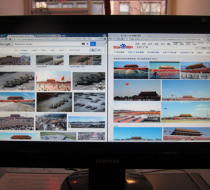Surf China’s Censored Web at an Internet Cafe in New York 1 Favorite
It may have been a while since you’ve set foot in an internet cafe, but a pop-up one on the Lower East Side offering free tea on top of free wifi is well worth a visit for a lesson in online freedoms. Established by video and installation artist Joyce Yu-Jean Lee in collaboration with technologist Dan Phiffer, the exhibition FIREWALL Internet Cafe NYC at Chinatown Soup enables visitors to navigate the internet as users in China do filter through the Great Firewall — from which the show takes its name. It allows you to experience, firsthand, the effects of internet censorship by the Chinese government that frustrates so many on a daily basis, and understand how different levels of accessibility may shape our understanding of our surroundings.
Each of the seven computer stations available is set up to display a split-screen of Google and Baidu (China’s leading search engine) so you may simultaneously surf the web in the US and in China. You may enter anything you wish into either search bar — depending on your language skills — and Lee and Phifer's custom-coded plugin will run a side-by-side image search then display the results. They’re almost always different, although, as you may imagine, the disparity between results for a search like “Tiananmen square” is greater than that for something like “peanut.” Sociopolitical matters are among the more heavily censored material; “Tiananmen square,” as Lee said, has actually been one of the most popular searches in her cafe. When you input the terms and hit enter, Google pulls up the famous image of the “tank man,” among other photographs related to the June 4, 1989, massacre; Baidu, however, finds scenic snapshots of the city square. The browser also posts a line above the results that notifies users of the sensitivity of their search subject.
Searching for more abstract terms also yields strange results, some of which illustrate differences in culture. “Happiness,” on Google, pulled up stock images of sunsets featuring silhouettes of people leaping up into the air; Baidu, however, brought up photographs of heterosexual weddings and one-child family pictures. “Myself,” entered into Google’s search bar, brought up images of the pronoun rendered in garish type, while the Baidu translation resulted in a lot of selfies, posted originally on social network profiles. Lee described this instance as “reverse censorship,” exemplifying a form of censorship implemented in the West to protect identity while safeguards against such leaking of private information have yet to be erected in China.











